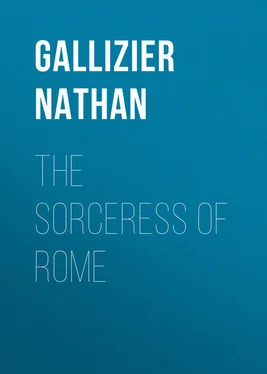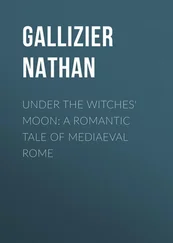Nathan Gallizier - The Sorceress of Rome
Здесь есть возможность читать онлайн «Nathan Gallizier - The Sorceress of Rome» — ознакомительный отрывок электронной книги совершенно бесплатно, а после прочтения отрывка купить полную версию. В некоторых случаях можно слушать аудио, скачать через торрент в формате fb2 и присутствует краткое содержание. Жанр: foreign_antique, foreign_prose, на английском языке. Описание произведения, (предисловие) а так же отзывы посетителей доступны на портале библиотеки ЛибКат.
- Название:The Sorceress of Rome
- Автор:
- Жанр:
- Год:неизвестен
- ISBN:нет данных
- Рейтинг книги:4 / 5. Голосов: 1
-
Избранное:Добавить в избранное
- Отзывы:
-
Ваша оценка:
- 80
- 1
- 2
- 3
- 4
- 5
The Sorceress of Rome: краткое содержание, описание и аннотация
Предлагаем к чтению аннотацию, описание, краткое содержание или предисловие (зависит от того, что написал сам автор книги «The Sorceress of Rome»). Если вы не нашли необходимую информацию о книге — напишите в комментариях, мы постараемся отыскать её.
The Sorceress of Rome — читать онлайн ознакомительный отрывок
Ниже представлен текст книги, разбитый по страницам. Система сохранения места последней прочитанной страницы, позволяет с удобством читать онлайн бесплатно книгу «The Sorceress of Rome», без необходимости каждый раз заново искать на чём Вы остановились. Поставьте закладку, и сможете в любой момент перейти на страницу, на которой закончили чтение.
Интервал:
Закладка:
There was a dead silence, which lasted for a space, until it grew almost painful in its intensity. At last Benilo spoke.
"To return to the night of her interment. Was there no one near you, to dispel those dread phantoms which maddened your brain?"
"I had suffered no one to remain. I wished to be alone with my grief."
"But whence the blow?"
"The masons had wrenched away an iron bar, in walling up the old entrance. Had the height been greater, I would not be here to tell the tale."
Benilo drew a deep breath. He was ghastly pale.
"But your purpose in Rome?"
"I will find the monk who conducted the last rites – I will have speech with Nilus, the hermit. If all else fails, the cloister still remains."
"Let me entreat you not to hasten the irrevocable step. Neither your king nor your country can spare their illustrious leader."
"Otto has made his peace with Rome. He has no further need of me," Eckhardt replied with bitterness. "But this I promise. I shall do nothing, until I have had speech with the holy hermit of Gaëta. Whatever he shall enjoin, thereby will I abide. I shall do nothing hastily, or ill-advised."
They continued for a time in silence, each wrapt in his own thoughts. Without one ray of light beaming on his course, Eckhardt beheld a thousand vague and shadowy images passing before his eyes. That subterranean love, so long crouched at his soul's stairway, had climbed a few steps higher, guided by some errant gleam of hope. The weight of the impossible pressed no longer so heavily upon him, since he had lightened his burden by the long withheld confession. The vertigo of fatality had seized him. By a succession of irregular and terrible events he believed himself hurried towards the end of his goal. A mighty wave had lifted him up and bore him onward.
"Whither?"
From the distance, borne aloft on the wings of the night-wind, came faintly the chant of pilgrims from secluded shrines on the roadway. Eckhardt's mind was made up. He would seek Nilus, the hermit. Perchance he would point out to him the road to peace and set at rest the dread misgivings, which tortured him beyond endurance. This boon obtained, what mattered all else? The End of Time was nigh. It would solve all mysteries which the heart yearned to know.
And while Benilo seemed to muse in silence over the strange tale which his companion had poured into his ear, the latter weighed a resolve which he dared not even breathe, much less confide to human ear. Truly, the task required of Nilus was great.
At last Eckhardt and Benilo parted for the night. Eckhardt went his way, pondering, and wondering what the morrow would bring, and Benilo returned among the ruins of the Palatine, where he remained seated for a time, staring up at the starry night-sky, as if it contained the solution of all that was dark and inscrutable in man's existence.
CHAPTER IV
THE WANTON COURT OF THEODORA
Astrange restlessness had seized the Chamberlain, after his meeting with the German commander. The moon illumined the desolate region with her white beams, dividing the silent avenues into double edged lines of silvery white, and bluish shadows. The nocturnal day with its subdued tints disguised and mantled the desolation. The mutilated columns, the roofs, crumbled beneath the torrents and thunders of centuries, were less conspicuous than when seen in the clear, merciless light of the sun. The lost parts were completed by the half tints of shadows; only here and there a brusque beam of light marked the spot, where a whole edifice had crumbled away. The silent genii of Night seemed to have repaired the ancient city to some representation of fantastic life.
As he hurried along the slopes of the hill, Benilo fancied at times that he beheld vague forms, lurking in the shadows; but they seemed to vanish the moment he approached. Low whisperings, an undefined hum, floated through the silence. First he attributed the noises to a fluttering in his ears, to the sighing of the night-wind or to the flight of some snake or lizard through the nettles. In nature all things live, even death; all things make themselves heard, even silence. Never before had Benilo felt such an involuntary terror. Once or twice he precipitately changed his course, hurrying down some narrow lane, between desolate looking rows of houses, low and ill-favoured, whose inmates recruited themselves from the lowest types of the mongrel population of Rome.
At the Agrippina below the bridge of Nero he paused and gave a sigh of relief. The phantoms seemed to have vanished. No breath of life broke the stillness. As on a second Olympus the marble palaces of the Cæsars towered on the summit of the Capitoline hill, glistening white in the ghostly moonlight. Below, the Tiber sent his sluggish waves down toward Ostia, rocking the fleet of numberless boats and barges which swung lazily at their moorings.
Benilo found himself in a quarter of Rome which had been abandoned for centuries. Ruins of temples and porticoes were strewn in the waste which he traversed. Here at least he could breathe more freely. No one was likely to surprise his presence in these solitudes. The superstition of the age prevented the Romans from frequenting the vale between Mounts Aventine and Testaccio after dark, for it was believed to be the abode of evil spirits.
As the Chamberlain made his way through the wilderness of fallen columns, shattered porticoes, and tangles of myrrh and acanthus, the faint clash of cymbals, like the echo of some distant bacchanalia, fell upon his ear. A strange fitful melody, rising and falling with weird thrilling cadence, was borne upon the perfumed breezes.
He had not advanced very far, when through an avenue of tall spectral cypress trees he emerged upon a smooth and level lawn, shut in by black groups of cedar, through the entwined branches of which peeped the silver moon.
Traversing a broad marble terrace, garlanded with a golden wealth of orange trees and odorous oleanders, Benilo approached a lofty building, surrounded at some distance by a wall of the height of half-grown palms. A great gate stood ajar, which appeared to be closely guarded. Leaning against one of the massive pillars which supported it, stood an African of giant stature, in scarlet tunic and white turban, who, turning his gleaming eyeballs on Benilo, nodded by way of salutation. Entering the forbidden grounds, the Chamberlain found himself in a spacious garden which he traversed with quick, elastic step, as one familiar with the locality.
As Benilo advanced under the leafy branches, swaying in melancholy relief against the blue-green sky, the sight of thousands of coloured lamps hanging in long festoons from tree to tree first caused him to start and to look about. A few moments later he was walking between quaintly clipped laurel and yew-bushes, which bordered the great avenue starred with semi-circular lights, where bronze and marble statues held torches and braziers of flame.
Sounds of joy and merry-making fell upon his ear, causing a frown, like a black shadow, to flit over his face, deepening by stages into ill-repressed rage. In whichever manner the dark prophecies concerning the Millennium may have affected the Romans and the world at large, it was quite evident they disturbed not the merry circle assembled in the great hall beyond.
At last Benilo found himself at the entrance of a vast circular hall. The picture which unfolded itself to his gaze was like a fairy fantasy. Gilded doors led in every direction into vast corridors, ending in a peri-style supported by pillars. These magnificent oval halls admitted neither the light of day nor the season of the year. The large central hall, at the threshold of which Benilo stood, reviewing the spectacle before him, had no windows. Silver candelabra, perpetually burning behind transparent curtains of sea-green gauze diffused a jewel-like radiance.
Читать дальшеИнтервал:
Закладка:
Похожие книги на «The Sorceress of Rome»
Представляем Вашему вниманию похожие книги на «The Sorceress of Rome» списком для выбора. Мы отобрали схожую по названию и смыслу литературу в надежде предоставить читателям больше вариантов отыскать новые, интересные, ещё непрочитанные произведения.
Обсуждение, отзывы о книге «The Sorceress of Rome» и просто собственные мнения читателей. Оставьте ваши комментарии, напишите, что Вы думаете о произведении, его смысле или главных героях. Укажите что конкретно понравилось, а что нет, и почему Вы так считаете.












